from:
https://www.traditioninaction.org/HotTopics/f192_Dialogue_99.htmDialogue Mass - XCIX
The Devil in the Rubrics
Dr. Carol Byrne, Great Britain
As the history of the Liturgical Movement has shown, the reformers from Benedictine monk Dom Lambert Beauduin to Vatican II went to great lengths to make the faithful believe that the clergy are not the only members of the Church with a right to perform the liturgy. According to their “new theology,” responsibility for enacting the Church’s worship is entrusted to all the People of God by virtue of their common Baptism. And that is fundamentally why “active participation” of all the laity became their watchword.
The revolution from above
Pius XII greatly aided this new direction by officially endorsing lay “active participation” as part of what he called a “liturgical apostolate” (Mediator Dei § 109) ‒ a direction replicated and developed by Paul VI in the Constitution on the Liturgy. (1)
This consideration will help us to realize how revolutionary was Pius XII’s policy of enacting legislation to enable all the members of the congregation to take a direct and active part in the Church’s rites. Tucked away in his new Ordo of Holy Week (1956) were rubrical instructions that specifically required their “active participation” in the ceremonies.
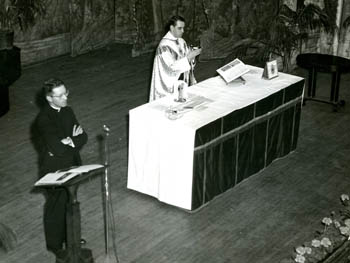 Fr. Frederick McManus performing
Fr. Frederick McManus performing
a Television Age Mass in 1969[color][size][font]
Fr. Frederick McManus, a major figure in the reform, made the following statement as soon as the new Holy Week
Ordo was issued:
“The rubrics of the
Ordo refer constantly to the responses to be made by the members of the congregation and to
their activity in the carrying out of the holy liturgy. This is of course a notable departure from the rubrical norms of the Roman Missal”. [Emphasis added] (2)
He went on to explain that the “active participation” of the congregation is “made a matter of rubrical law and incorporated into the very text of the new liturgical book.” (3)
But in the Roman Rite before the Liturgical Movement, there had never been any official rubrics assigned by the Church for the laity. The Missal of Pope Pius V (1570) contained rubrics for the priest and his ministers to perform the sacred ceremonies, but none for the people in the pews. (4) And this position was enshrined in the
1917 Code of Canon Law. (5)
As a canon lawyer, Fr. McManus would have realized the contradictory nature of Pius XII’s innovation and its full significance for the Liturgical Movement’s goals. The primary characteristic of this breakthrough was the profound challenge it posed to the foundations of the ordained priesthood, which set the clergy apart from the laity, and gave them the exclusive right to perform the Church’s official liturgy.
[/font][/size][/color]
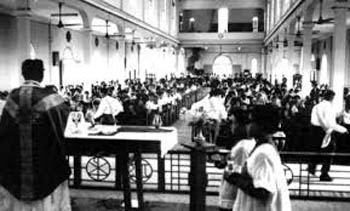 A priest facing the people who are now participating actively in a 1969 Mass
A priest facing the people who are now participating actively in a 1969 Mass[color][size][font]
The new rubrical law was based on the premise that lay people were entitled to a role as “actors” in the liturgy, with an officially recognized right to active involvement in the external rites alongside the clergy. It was a reversal of Canon 1256 of the
1917 Code of Canon Law, which reiterated the traditional position that the Church’s public worship is a function of its legitimately appointed clergy. The wall separating the ordained from the non-ordained was now breached.
The introduction of rubrical laws into the Missal to legitimize the responses of the congregation and “their activity in the carrying out of the holy liturgy” was, as Fr. McManus observed, an unprecedented step. No Pope, least of all Pius X, had ever done anything like it before. Whereas previous editions of the Missal gave instructions only to the server, deacon or choir to give certain responses to the priest, the new rubrics included the whole congregation in this function.
[/font][/size][/color]
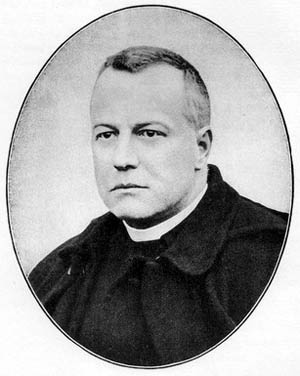 Fr. Fortescue: Liturgical rubrics apply to those who assist officially the Mass, not the laity
Fr. Fortescue: Liturgical rubrics apply to those who assist officially the Mass, not the laity[color][size][font]
This decision was certainly problematic in expressing as a rule of law something that had previously been considered illegitimate. The rubrics of the Missal were, by their very nature, laws requiring obedience from those who were responsible for performing the Church’s liturgy.
They were never intended for the laity. Fr. Adrian Fortescue pointed out in 1920 that “lay people in the body of the church … enjoy a natural liberty,” and that the liturgical rubrics apply only to “those who assist more officially, the server, clergy, others in choir, and so on.” (6)
Such a remarkable departure from tradition surely calls for a consideration of its legal and constitutional basis. We need to be clear whether it was a just law promoting the Common Good, and in what way it can be said to reflect the constitution of the Church. This had been defined by Pope Pius X as “inherently (
“vi et natura sua”) an
unequal society, that is, a society comprising two categories of persons, the Pastors and the flock, those who occupy a rank in the different degrees of the hierarchy and the multitude of the faithful.” (7)
In two mindsPius XII stated in
Mediator Dei § 93 that the action of the liturgy was the privilege only of the priest, and that the faithful participate by uniting their hearts with his intentions. Thus he upheld the immemorial practice of the Roman Rite in which the priest performed the visible, external rite, while the faithful present joined their prayers mentally with the actions of the priest, and offered spiritual sacrifices.
But in §105 of the same docuмent, he rendered this teaching incoherent by conferring on the members of the congregation the right to become directly involved in the liturgical action “in an external way.”
The licensing of disorderThe problem, therefore, with the new legislation was that it was constructed on ambivalence. The role of the priest in the Mass was no longer “fixed” but relativized by being shared on an active level with the people.
It introduced the spirit of democracy into the Church years before Vatican II. One cannot interfere with the basic order observed for centuries in the Church without inviting harmful collateral consequences.
[/font][/size][/color]
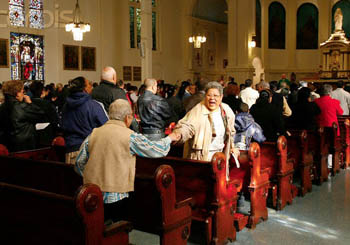 The spirit of revolutionary equality &
The spirit of revolutionary equality &
fraternity entered the Church[color][size][font]
There is something unreal and unacceptable from a Catholic point of view about this development on account of the insuperable ontological and doctrinal problems it poses. For priests and faithful of the Roman Rite, there was the danger that it would distort their perception of the hierarchical nature of the Church and engender confusion in their minds about the distinction between ordination and simple baptism.
And that is precisely the position in which the post-conciliar Church finds itself with the whole People of God jointly celebrating the Mass and Sacraments by reason of their “common priesthood.” Vatican II’s Constitution on the Liturgy (§ 31), developing the principle started by Pius XII, stipulated that when the liturgical books were revised, they “must carefully attend to the provision of rubrics also for the people’s parts.”
One does not need to be an expert in liturgiology to see the likely effect this would have on a Catholic understanding of the Mass and the priesthood. It would undermine the very notion of exclusivity at the heart of the ordained priesthood: it is, after all, the Mass that makes the priest and gives him his identity.
When the General Instruction of the
Novus Ordo was produced in 1969, Cardinal Ottaviani noted its “obsessive references to the communal character of the Mass,” adding that “the role attributed to the faithful is autonomous, absolute – and hence completely false,” and that “the people themselves appear to be invested with autonomous priestly powers.” (8)
Pius XII as an agent of changeIn Pius XII’s detailed
Instruction De Musica Sacra (1958) – which reads like a handbook for inserting lay participation in almost every nook and cranny of the liturgy – we see the beginnings of the so-called “community Mass” called for by the reformers.
Henceforth, the emphasis would increasingly be placed on communal responses by the whole congregation speaking aloud, which would make it difficult, if not impossible, for them to continue in their time-honored custom of individually-chosen silent prayers. It would, in other words, spell the end of the so-called “silent Mass” beloved of the people. There is plenty of evidence to indicate that for Beauduin and many in the Liturgical Movement this was a desirable outcome.
[/font][/size][/color]
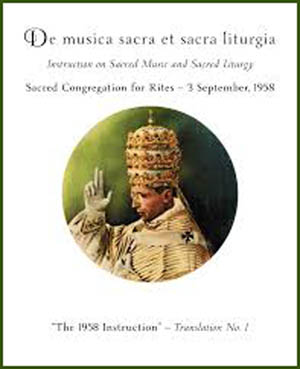 Includes the ‘people’s parts’
Includes the ‘people’s parts’[color][size][font]
Few understood at the time that the novelty of including the laity in the rubrics of the Missal would create a paradigm shift in the liturgy that would require across-the-board new thinking in almost every aspect of it. Where this reform was heading was towards the progressivist concept of the liturgy enshrined in the
Novus Ordo when “active participation” would become incuмbent on all the laity as their duty and responsibility.
It was at the behest of the reformers that Pius XII began a process that had the gravest possible implications for future changes in the liturgy. His innovative rubrics for the laity were incorporated into the 1962 Missal by Pope John XXIII, and were followed immediately by a never-ending succession of desacralizing reforms, each one decreasing the role of the priest celebrant while greatly promoting the “active participation” of the laity.
IIt was the beginning of a new, relativized situation in the Church where the accepted distinctions between clergy and laity in the liturgy no longer applied.
To be continued[/font][/size][/color]
- § 45 of the Constitution on the Liturgy states that “every diocese is to have a commission on the sacred liturgy under the direction of the bishop, for promoting the liturgical apostolate.”
- Frederick McManus, The Rites of Holy Week: Ceremonies, Preparations, Music, Commentaries, New Jersey: St Anthony Guild Press, 1956, pp. viii-ix.
- Ibid., p. ix.
- The rubric in Chapter 17, § 2 of the General Rubrics directing those present (circuмstantes) to kneel except during the Gospel is sometimes misquoted as referring to the congregation. But as this rubric pertains to private Masses, i.e., without a congregation, the reference is to the server(s) at the altar.
- No mention of “active participation” by the congregation was made in the 1917 Code of Canon Law, which had been drawn up under the direction of Pius X; and no change was made to Canon 1256, which stipulated that the Church’s public worship is a function of its legitimately appointed ministers. Nor was any change made to Canon 818, which prohibited the addition of any liturgical arrangements not covered by the rubrics of the Missal.
- A. Fortescue, Ceremonies of the Roman Rite Described, London: Burns Oates and Washbourne, 1920, p. 78, Footnote 2.
- Pius X, Vehementer nos, 1906, § 8.
- Short Critical Study of the New Order of Mass, commonly known as the “Ottaviani Intervention,” written by a group of theologians and presented to Pope Paul VI by Cardinal Ottaviani (Prefect Emeritus of the Congregation of the Doctrine of the Faith) and Cardinal Bacci in 1969.